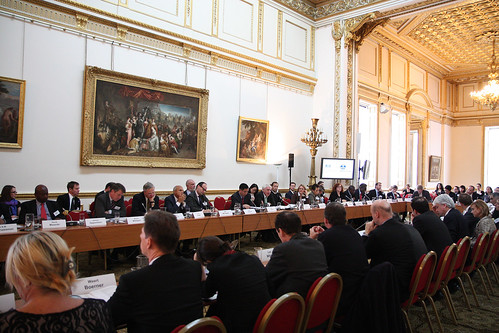24th April 2012 Ottawa, Canada
Climate and resource security
Guest blog from Head of Global Issues Group Euan Wallace:
Last month I found myself at Lancaster House attending an Foreign Office/Wilton Park Conference: “A climate and resource security dialogue for the 21st Century.” The conference had been many months in the planning and I was lucky to get a place alongside a few other attachés from posts in the US, India and elsewhere.

Wilton Park events take place under a rigorous protocol which means that apart from a few on the record speeches, I am not allowed to attribute particular comments with specific individuals. So these reflections are necessarily my own, supplemented with material I know is a matter of record.
Things got off to a cracking start on Day One with a welcome speech by new DECC SofS Ed Davey, the first time I had seen him in action. His intervention was a well judged combination of light and shade, pulling no punches as to the scale of the challenge, but with a suitable element of encouragement for those of us in the room ready to debate the issues.
President Ali Bongo Ondimba of Gabon was next and spoke eloquently demonstrating that climate change and its impact on human security is very much a reality in Africa and elsewhere.
We also had the unique opportunity to be addressed by the 4th in line to one of the European thrones, Jaime de Bourbon Palme. I found him deeply impressive, full of humility and as down to earth as anyone else in the room. If not more so. He endeared himself to one of my colleagues when he asked for directions to the nearest tube station: no chauffeur-driven limos for him! He stayed from the very beginning to the very end of the conference, actively participating throughout.
The first day ended with a reception hosted by the FCO’s Lord Howell of Guildford and by MoD Minister Andrew Robathan. As I headed to my hotel that evening what struck me most was the diversity of the organisations represented and the many nationalities involved, juxtaposed with the clarity and convergence of the message: there is a problem and we need to find ways to fix it. Fast!
If Day One was about setting the scene, Day Two was about trying to figure out what we were going to do about it. The challenge of dealing with various regional actors was considered from all angles. One participant encouraged us to consider other non-government actors, such as the private sector, in our deliberations about climate solutions: a message which resonated with me. I would have liked to have seen more on the public/private partnership angle to this issue. Doubtless that will come later.
Various concluding speakers spoke of the progress that had been made here. Others promised to take the debate forward to the next stop on the challenging trail to enlightenment. I was left in no doubt as to the utility of the occasion in bringing people together and of demonstrating our continued commitment to the cause. Other countries and organisations were identified to do their bit take the issue forward. To my mind the Conference represented an evolution of the debate and not revolution. But as long as people keep talking about climate security, spreading these important messages and sharpening their narrative, then there is reason to hope that we are continuing to move forward towards finding solutions to the challenge of maintaining human security in a rapidly changing climate.
I couldn’t help myself thinking on the way to the airport of the metaphor of the boiling frog. I know it’s not an original thought, Al Gore mentioned it in “An Inconvenient Truth”, and the fable itself has been around forever. But as London and Ottawa sweltered through record breaking temperatures that week, I wondered if anyone else thought it ominous?